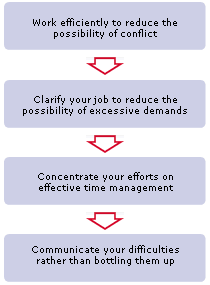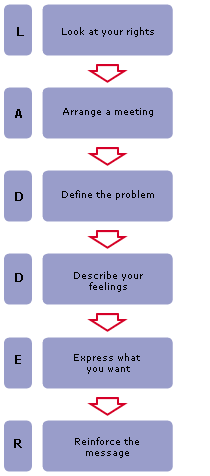There are always people who have the power to affect
you and your goals. The influence of your manager, clients, politicians,
and others within or outside the organization may be a source of severe
stress.
Handle Potential Conflict
People may sometimes
undermine or block you, load you with stressful tasks, or be
unreasonable in their demands. Clients may see things in the short term
and try to get as much out of you as they can, regardless of the
long-term consequences for you. Your relationship with your manager is
of great importance here, as you try to balance work and free time,
manage your workload, and handle apparently excessive demands or
unreasonable behaviour.
Case Study: Setting the Limits
For months Naseema had
been working long hours, trying to do all of the things her boss wanted
her to do, but as soon as she finished one job, her boss would give her
more to do. She was exhausted. The work was piling up around her, and
she was losing sleep over it.
Reflecting on the
situation, she was aware of how much she wanted to impress her manager
and of how she always said “yes” politely when asked to do something.
Naseema thought about what her workload should be, and arranged a
meeting with her manager. She calmly and clearly explained the situation
and asked for the help of an assistant. Within a month Naseema had the
help she needed and was no longer losing any sleep.
Naseema’s
manager wasn’t a tyrant – he was just busy himself, and assumed that
Naseema would say when she was becoming overloaded.
Because
Naseema approached her manager in an adult way, he engaged with her as
an adult and worked with her to resolve the problem she was having.
By presenting a workable solution, Naseema made it easy for her manager to say “yes”.
Believe in Yourself
If you are using time
management and planning skills well, you can be confident that you are
working efficiently and effectively. If you have fully clarified your
job using the job analysis tool and are acting appropriately, then you
are concentrating your efforts on the right activities. If your workload
is still excessive or your working conditions unreasonable, you need to
change the situation.
Dealing with people in power, whether clients or managers, is all
about communication. Talk over potential problems before they have a
chance to get out of hand.


Resolve a Stressful Situation
This six-step procedure will help you to remedy
sources of stress in an assertive way with the person in power. Use the
acronym LADDER to guide you through this process.
Look at your rights and what you want, and understand why you feel
the way you do about the situation. Analyze, as unemotionally as
possible, why you feel your rights are being violated.
Arrange a formal meeting with the person in power to discuss the
situation. This shows how important the situation is to you and ensures
that sufficient time will be allocated to discussing it.
Define the problem specifically. Keep information objective and
uncoloured by emotion. Make sure your comments are correct and are
supported by the facts.
Describe your feelings so that the other person fully understands
how you feel and how important it is to you to resolve the situation.
Express what you want clearly and concisely – prepare some
reasonable proposals before the meeting. Be courteous, but take care not
to confuse your message.
Reinforce your message to the other person, explaining what the
benefits of the course of action will be and showing how your solution
will improve the situation.

Change Your Situation
NOTE
Favours have no place in the work environment
You can do this well or
you can do it badly. Taking a submissive position when you communicate,
hoping to minimize any potential conflict arising from the request, is a
weak approach, because you put yourself in the position of asking a
“favour” that may well be denied. Another bad approach is to be
aggressive and try to force someone into giving you what you want. While
this can be successful in the short term, it can damage long-term
relationships. This will clearly be a problem if you are dealing with
your manager.
Tip
If you are making a request that may be unwelcome,
the best approach is to communicate your needs assertively.
Be Assertive
Ask for what you want
in a fair, reasonable, and positive manner, making your request clearly
and openly, explaining rationally why you want it, without trying to use
emotional leverage. Keep your request short, direct, and unambiguous.
Do not attack or blame the other person for the problem. This is the
most effective way to defend your right to a well-balanced life, and to
express and get what you want in a manner that is non-manipulative and
adult.
How to Get What You Want
High Impact
Negative Impact